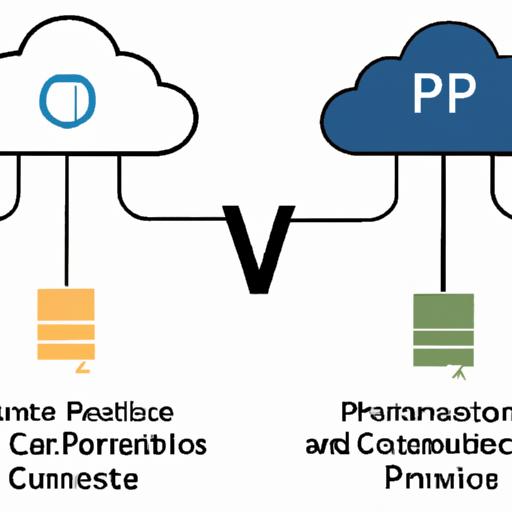Private Cloud vs On-Premise: Making the Right Infrastructure Choice
In today’s rapidly evolving digital landscape, businesses face a crucial decision when it comes to their IT infrastructure. The choice between private cloud and on-premise solutions can significantly impact their operations, scalability, security, and overall success. But what exactly do these terms mean, and why is it so important to make the right choice?
Private Cloud: An Overview of Limitless Possibilities
Private cloud refers to a virtualized infrastructure that is dedicated to a single organization. It offers a scalable and flexible environment where resources can be provisioned and managed internally. With private cloud, businesses can enjoy the benefits of cloud computing while maintaining control over their data and applications.
This innovative solution provides a wide range of advantages. Scalability is one of the key benefits, allowing businesses to easily adjust their resources based on fluctuating workloads. The flexibility of private cloud enables seamless access to critical applications and data from anywhere, empowering teams to work efficiently and collaboratively. Moreover, private cloud solutions are often more cost-effective, eliminating the need for substantial upfront investments in hardware and infrastructure maintenance.
On-Premise: Unleashing the Power of Control and Customization
On-premise infrastructure, on the other hand, involves hosting all resources and systems within the organization’s physical premises. With this approach, businesses have complete control over their IT environment, ensuring data sovereignty and compliance with industry-specific regulations.
The primary advantage of on-premise solutions lies in the level of control they provide. Organizations can fine-tune and customize their infrastructure to meet their unique requirements. This level of customization allows businesses to optimize their IT environment for specific applications, resulting in enhanced performance and efficiency. Additionally, on-premise solutions offer robust security measures, as sensitive data remains within the organization’s premises, mitigating the risk of external breaches.
Choosing the Right Infrastructure for Your Business
The decision between private cloud and on-premise infrastructure is not a one-size-fits-all solution. It depends on various factors such as the nature of the business, industry regulations, and budgetary considerations. Understanding the distinctions between these options is vital in making an informed decision that aligns with your specific needs and objectives.
In the upcoming sections, we will delve deeper into the comparison between private cloud and on-premise solutions, exploring their differences in terms of cost, scalability, security, and maintenance. We will also analyze real-world use cases to help you determine which infrastructure option is best suited for your organization.
Remember, the right infrastructure choice can pave the way for your business’s growth and success while ensuring optimal performance, security, and efficiency. So, let’s embark on this journey of exploration and discovery, shedding light on the private cloud versus on-premise debate.
Private Cloud: Overview and Benefits
Definition and Explanation of Private Cloud
Private cloud, also known as an internal or corporate cloud, refers to a virtualized computing environment that is exclusively dedicated to a single organization. It is built within the organization’s own data centers or hosted by a third-party provider. This cloud infrastructure provides businesses with the agility and scalability of cloud computing while maintaining the control and security associated with traditional on-premise solutions.
Private clouds operate on a virtualization layer, enabling the pooling of computing resources such as servers, storage, and networking. This virtualized environment allows for the efficient allocation and utilization of resources, ensuring optimal performance and responsiveness.
Advantages of Private Cloud
Private cloud offers a myriad of advantages that make it an attractive option for businesses across various industries:
1. Scalability: Private cloud enables organizations to scale their resources up or down based on their needs. With the ability to quickly provision and allocate computing resources, businesses can seamlessly handle surges in demand or accommodate growth without disruptions.
2. Flexibility: Private cloud provides organizations with the flexibility to tailor their infrastructure to their specific requirements. This customization allows businesses to optimize their IT environment, supporting critical applications and workflows that are unique to their operations.
3. Cost-Effectiveness: Private cloud solutions can offer cost savings compared to traditional on-premise infrastructure. By leveraging virtualization and shared resources, businesses can reduce hardware expenses, eliminate the need for extensive physical infrastructure, and optimize energy consumption.
Industries that Can Benefit from Private Cloud
Private cloud solutions have proven beneficial for various industries, including:
1. Healthcare: The healthcare industry deals with sensitive patient data and stringent regulatory requirements. Private cloud solutions provide the necessary control and security to ensure compliance while enabling seamless access to critical patient information.
2. Finance and Banking: Financial institutions handle vast amounts of confidential data and require robust security measures. Private cloud infrastructure allows these organizations to maintain control over their sensitive data while taking advantage of cloud scalability for improved performance.
3. Government Agencies: Government agencies often have unique data privacy and security requirements. Private cloud solutions offer the control and customization needed to meet these strict regulations while enabling efficient collaboration and information sharing.
Private cloud’s ability to combine scalability, flexibility, and cost-effectiveness makes it an appealing choice for various industries with specific needs and regulatory considerations. As we move forward, we will explore the advantages and use cases of on-premise infrastructure to provide a comprehensive understanding of the private cloud vs. on-premise debate.
On-Premise: Overview and Benefits
Defining On-Premise Infrastructure
On-premise infrastructure refers to the traditional approach of hosting and managing IT resources within an organization’s physical premises. Unlike the cloud-based solutions, which rely on off-site data centers, on-premise infrastructure keeps everything in-house. This means that hardware, servers, applications, and data storage are all physically located within the organization’s facilities.
Advantages of On-Premise
Control: Power in Your Hands
One of the primary advantages of on-premise infrastructure is the level of control it offers. By having complete ownership and management of the hardware and software, organizations can make quick decisions and modifications. This control allows businesses to customize their IT environment according to their specific needs, ensuring optimal performance, compatibility, and resource allocation.
Security: Shielding Your Data
For industries that handle sensitive information, data security is of paramount importance. On-premise solutions provide enhanced security measures as data remains within the organization’s premises. This reduces the risk of external breaches and ensures compliance with industry-specific regulations and data privacy standards. Organizations can implement robust security protocols, monitor access controls, and employ encryption techniques to safeguard their valuable information.
Customization: Tailoring Solutions to Fit
On-premise infrastructure enables organizations to tailor their IT environment to meet their unique requirements. Whether it’s optimizing hardware configurations, fine-tuning software applications, or developing custom solutions, the flexibility of on-premise allows businesses to optimize their resources and achieve maximum efficiency. This level of customization is particularly valuable for industries with specialized software needs or complex IT workflows.
Industries Preferring On-Premise Solutions
While the cloud has gained significant popularity in recent years, there are still industries that prefer on-premise solutions. Sectors such as government, healthcare, finance, and legal industries often prioritize on-premise infrastructure due to stringent regulations, compliance requirements, and the need for complete control over data. These industries handle sensitive information and must adhere to strict security and privacy protocols, making on-premise solutions a preferred choice.
By harnessing the power of on-premise infrastructure, businesses in these industries can maintain the highest level of control, security, and compliance while leveraging the benefits of advanced technology.
In the next section, we will delve deeper into the comparison between private cloud and on-premise infrastructure, analyzing factors such as cost, scalability, security, and maintenance. This analysis will assist you in making an informed decision about which infrastructure option is best suited to your organization’s unique needs and objectives.
Comparison: Private Cloud vs On-Premise
Key Differences Between Private Cloud and On-Premise Infrastructure
When comparing private cloud and on-premise infrastructure, several key differences come to light. Understanding these distinctions is essential in making an informed decision for your business’s IT infrastructure. Let’s explore some of the primary contrasts:
1. Cost: Private cloud solutions often involve a pay-as-you-go model, allowing businesses to scale resources and only pay for what they use. On the other hand, on-premise infrastructure requires upfront investments in hardware, software, and maintenance costs.
2. Scalability: Private cloud offers unparalleled scalability, enabling businesses to quickly and easily scale resources up or down based on their needs. With on-premise infrastructure, scaling requires additional hardware procurement and installation, making it a more time-consuming process.
3. Security: Private cloud solutions provide robust security measures, including data encryption, access controls, and dedicated firewalls. On-premise infrastructure offers a higher level of control over security measures, as organizations can implement their own security protocols tailored to their specific requirements.
4. Maintenance: Private cloud solutions shift the responsibility of infrastructure maintenance to the service provider, allowing businesses to focus on core operations. With on-premise infrastructure, organizations are responsible for ongoing maintenance, updates, and troubleshooting.
Factors to Consider When Choosing Between Private Cloud and On-Premise
While the key differences outlined above shed light on the comparison between private cloud and on-premise infrastructure, several other factors warrant consideration before making a decision. Let’s delve into these critical aspects:
1. Workload and Resource Demands: Assess the specific needs of your business and evaluate the scalability requirements of your applications and workloads. If your organization experiences fluctuating resource demands or anticipates rapid growth, private cloud solutions may offer the agility required to meet those demands effectively.
2. Data Security and Regulatory Compliance: Consider the sensitivity of your data and the industry-specific regulations that govern your organization. If data sovereignty and compliance are paramount, on-premise infrastructure may be the preferred choice as it allows for greater control and customization to meet stringent security and compliance requirements.
3. Budgetary Considerations: Evaluate your budget and financial constraints. While private cloud solutions offer cost-effectiveness through pay-as-you-go models, on-premise infrastructure requires upfront investments. Consider the long-term costs and potential ROI associated with each option.
4. In-House Expertise and IT Team: Assess the capabilities and expertise of your in-house IT team. Private cloud solutions often offload maintenance and management responsibilities to the service provider, while on-premise infrastructure requires dedicated IT personnel to handle upkeep and support.
By carefully analyzing these factors and aligning them with your organization’s unique needs, you can make an informed decision regarding the most suitable infrastructure option: private cloud or on-premise. Next, we will explore real-world use cases to provide further insights into when each option is ideal.
Use Cases: When to Choose Private Cloud or On-Premise
Optimal Scenarios for Private Cloud
Startups and Growing Businesses: For startups and rapidly expanding businesses, private cloud infrastructure offers the perfect solution. Its scalability allows organizations to easily accommodate increasing workloads and seamlessly handle spikes in demand. As startups often operate on limited budgets, private cloud’s cost-effectiveness eliminates the need for substantial upfront investments in infrastructure.
Fluctuating Workloads: Industries with fluctuating workloads, such as e-commerce or seasonal businesses, can greatly benefit from private cloud solutions. With the ability to quickly scale resources up or down, businesses can efficiently manage peak periods without overprovisioning or facing performance bottlenecks. Private cloud empowers organizations to adapt to changing demands and ensures uninterrupted operations during critical periods.
Preferred Scenarios for On-Premise
Highly Regulated Industries: Certain industries, such as healthcare, finance, or government sectors, face stringent regulations regarding data privacy and security. In such cases, on-premise infrastructure provides organizations with complete control over their sensitive data. By keeping data within their physical premises, businesses can ensure compliance with industry-specific regulations and maintain a higher level of security.
Strict Data Privacy Requirements: Organizations dealing with highly confidential or proprietary information may prefer on-premise solutions to maintain full control over data access and security. On-premise infrastructure allows businesses to implement customized security measures and establish internal protocols to safeguard sensitive data, mitigating the risk of external breaches.
By carefully evaluating your business’s unique requirements and considering factors such as workload fluctuations, industry regulations, and data privacy concerns, you can determine whether private cloud or on-premise infrastructure is the ideal fit for your organization.
In the next section, we will delve into a comprehensive comparison between private cloud and on-premise infrastructure, analyzing essential aspects like cost, scalability, security, and maintenance. Let’s explore these factors to guide you in making an informed decision that aligns perfectly with your business objectives and needs.
Conclusion
In conclusion, the decision between private cloud and on-premise infrastructure is a critical one that can significantly impact a business’s operations and success. Understanding the differences and benefits of each option is crucial to making an informed decision.
Private cloud offers scalability, flexibility, and cost-effectiveness, making it an ideal choice for businesses with fluctuating workloads and limited resources. It empowers organizations to leverage the benefits of cloud computing while maintaining control over their data and applications.
On the other hand, on-premise infrastructure provides businesses with complete control, customization, and enhanced security. It is particularly suitable for highly regulated industries and organizations with strict data privacy requirements.
When making this decision, it is essential to consider factors such as cost, scalability, security, and maintenance. Assessing the specific needs and objectives of your organization will guide you towards the most appropriate infrastructure choice.
Ultimately, there is no one-size-fits-all solution. Each business is unique, and the right infrastructure choice depends on various factors. By carefully evaluating your requirements and understanding the distinctions between private cloud and on-premise, you can make a well-informed decision that aligns with your organization’s goals.
Remember, the choice you make today will shape the future of your business. Embrace the possibilities of private cloud or unleash the power of on-premise – the path you choose will pave the way for growth, efficiency, and success.
Now, armed with knowledge and understanding, it’s time to embark on your infrastructure journey. Choose wisely and embrace the opportunities that lie ahead.





